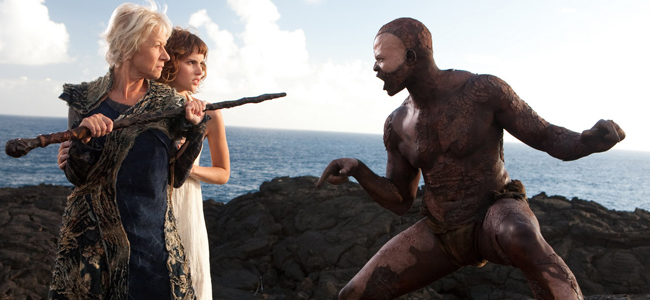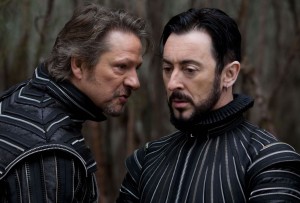
More Across the Universe than Titus Julie Taymor’s latest serves up Shakespeare with a rock reverb that fails to be as daringly original or as visually stunning as her past works. Rock songs are forced out of Shakespeare’s soliloquies adding to the generally clunky construction of this postmodern adaptation of William Shakespeare’s The Tempest. This problematic fantasy centers on the duchess of Milan, Prospera, (traditionally Prospero – a duke) and her young daughter, Miranda, who were left for dead on a ravaged ship by a traitorous brother and faithless king. Stripped of her land and title, the sorceress made her way to an untamed land, where she named herself master of all she saw, claiming dominion over the natives—like the awkwardly androgynous Ariel and the monstrous half-man Caliban. As the film begins, 15 years has passed and Prospera has drawn her enemies to the island to punish those that wronged her and restore her position by marrying her daughter to the King’s son.
Traditionally, it’s a difficult play. The central love story between Miranda and Ferdinand lacks the challenging obstacles of family, stubbornness, or complex charade that complicated the romances of more famous Shakespearean lovers. Instead, Prospera (played respectfully by Helen Mirren) feigns a hatred for the boy so that her daughter and he will cling to each more fervently, which is surely the foundation of a lasting love. Then there’s the matter of the severed narrative. The play jumps about from Prospera and her Ariel tormenting her hateful brother to the lovers and their doe-eyed gazes to the comic relief of the drunk, the fool, and the monster – or Stephano (Alfred Molina), Trinculo (Russell Brand), and Caliban (Djimon Hounsou) – and back again. I’ve seen this show staged several times and it never fails to be unwieldy, and sadly, Taymor’s Tempest never manages to rise above the muck.
The lovers (Felicity Jones and Reeve Carney) are pretty but dull. The broad comedy stylings of Brand and Molina seemed more fitting to local theater than a Taymor production, and overall the incredibly well-reputed cast (which also includes Chris Cooper, Alan Cumming, Tom Conti and David Strathairn) has little to work with, dwarfed as they are by the lack of innovation of the story’s troubled structure and smothered in a plethora of perplexing art direction choices.
I walked into the theater knowing I was never much a fan of the play The Tempest, but felt confident that wouldn’t matter, as I didn’t care for Titus Andronicus until I saw Titus with its electric performances and exhilarating visuals. I expected something as awe-inspiring here, and instead saw sequence after sequence that felt old-hat and random: fast-motion effects reminiscent of the made for TV movie Merlin, a CGI dream/vision sequence that seemed more a zodiac screen saver than a movie set piece, and costumes so puzzling they proved an awful distraction. (What is that written on Caliban’s thigh?)
 To create a sense of danger and emphasize her theme of wildness Taymor wraps her natives in deconstructed garbs, which contrast sharply with severe attire of the men of Milan, whose major export must be zippers as they adorn every inch of their clothing. Then she surrounds her characters with the natural beauty and inherent anxiety of the land around a Hawaiian volcano. Finally she tops this flat translation off with a rock soundtrack that echoes over the plot and landscape without ever seeming to sink in. There’s a lot going on, but none of it feels new or exciting, which was a real shock coming from one of today’s most interesting visual filmmakers.
To create a sense of danger and emphasize her theme of wildness Taymor wraps her natives in deconstructed garbs, which contrast sharply with severe attire of the men of Milan, whose major export must be zippers as they adorn every inch of their clothing. Then she surrounds her characters with the natural beauty and inherent anxiety of the land around a Hawaiian volcano. Finally she tops this flat translation off with a rock soundtrack that echoes over the plot and landscape without ever seeming to sink in. There’s a lot going on, but none of it feels new or exciting, which was a real shock coming from one of today’s most interesting visual filmmakers.
All in all, I was profoundly disappointed in this adaptation, as I have high expectations of Taymor’s work. In the past her films have proved moving, shocking, powerful, or at the very least visually remarkable. But here, the rock-rattled Shakespeare, the tired yet garish design, and the muddled story structure all leads to a film not worthy of its cast or creator.
The Tempest is an utter mess.

The Tempest opens December 10, 2010.

